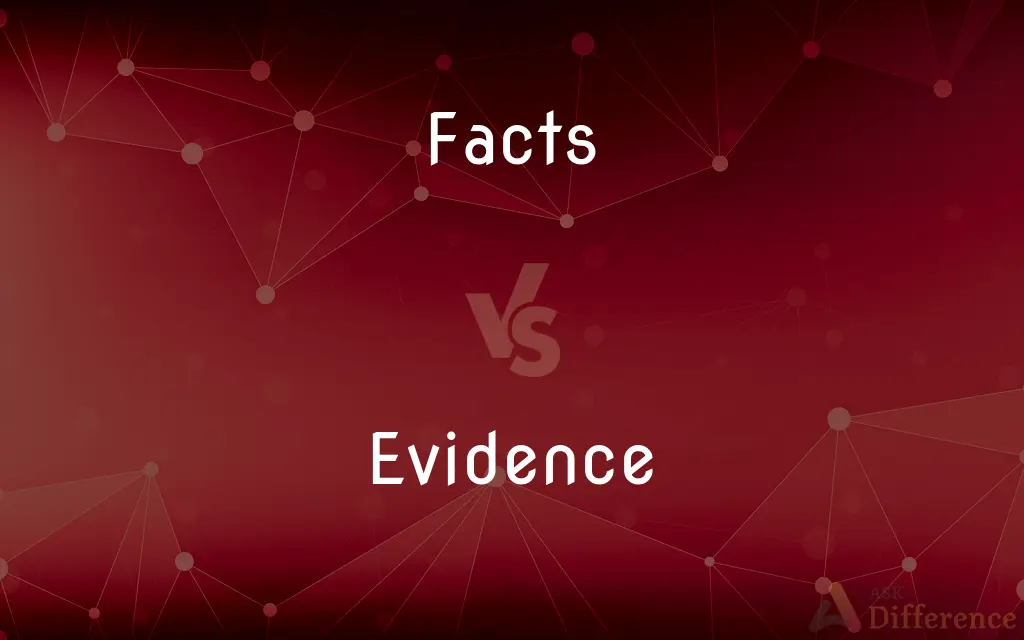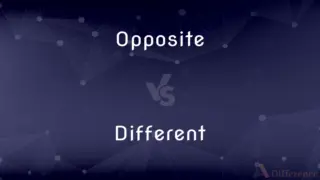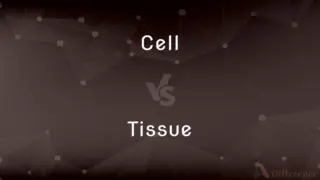Facts vs. Evidence — What's the Difference?
By Maham Liaqat & Fiza Rafique — Updated on March 15, 2024
Facts are objective truths known through experience or observation, while evidence is information used to support or refute a claim or belief.

Difference Between Facts and Evidence
Table of Contents
ADVERTISEMENT
Key Differences
Facts are indisputable truths that are universally accepted and verifiable. They stand on their own and do not require validation from external sources. Evidence, on the other hand, comprises various types of information or data used to prove or disprove something, often within a specific context such as legal, scientific, or academic inquiries.
A fact is a statement that can be proven true or false through direct observation or reliable documentation. For example, stating that water boils at 100°C at sea level is a fact. In contrast, evidence is used in arguments or investigations to support a hypothesis or a theory, like fingerprints at a crime scene being evidence to support claims about a suspect's presence.
Facts are often used as evidence, but not all evidence is considered a factual statement. Evidence can be subjective and open to interpretation depending on the context and its relevance to the claim it supports or refutes. For instance, an eyewitness account can be evidence in a legal case, but the reliability and interpretation of that account can vary.
While facts provide a foundation for knowledge and understanding, evidence is instrumental in building and testing theories, arguments, or cases. Evidence leads to the discovery of new facts or the reassessment of existing beliefs and knowledge.
Both facts and evidence are crucial in different domains, including science, law, and daily decision-making. Facts establish a common ground for understanding, whereas evidence is key to reasoning, persuasion, and proving or disproving hypotheses and claims.
ADVERTISEMENT
Comparison Chart
Definition
Objective truths known through direct observation or reliable documentation.
Information or data used to support or refute a claim, hypothesis, or belief.
Nature
Indisputable and universal
Can be subjective and open to interpretation
Function
Provide a foundation for knowledge and understanding
Support or challenge theories, arguments, or legal cases
Example
The Earth orbits the Sun.
Fingerprints found at a crime scene.
Dependency
Standalone and verifiable independently
Relies on context and relevance to a specific claim or argument
Compare with Definitions
Facts
Verifiable truth.
The Pacific Ocean is the largest ocean on Earth.
Evidence
Support for claims.
DNA evidence can link a suspect to a crime scene.
Facts
Universally accepted.
Humans need oxygen to survive.
Evidence
Can be physical or digital.
Surveillance footage is often used as evidence in court.
Facts
Observable reality.
Water freezes at 0°C.
Evidence
Subject to interpretation.
An eyewitness account can be considered evidence but may be influenced by personal bias.
Facts
Independent of belief.
The speed of light in a vacuum is approximately 299,792 kilometers per second.
Evidence
Varied forms.
Written documents, testimonies, and artifacts can all serve as evidence in historical research.
Facts
Consistent and stable.
There are 24 hours in a day.
Evidence
Integral to research.
Scientists use experimental data as evidence to support their hypotheses.
Facts
Knowledge or information based on real occurrences
An account based on fact.
A blur of fact and fancy.
Evidence
Evidence for a proposition is what supports this proposition. It is usually understood as an indication that the supported proposition is true.
Facts
Something demonstrated to exist or known to have existed
Genetic engineering is now a fact. That Chaucer was a real person is an undisputed fact.
Evidence
A thing or set of things helpful in forming a conclusion or judgment
The broken window was evidence that a burglary had taken place. Scientists weighed the evidence for and against the hypothesis.
Facts
A real occurrence; an event
Had to prove the facts of the case.
Evidence
Something indicative; an indication or set of indications
Saw no evidence of grief on the mourner's face.
Facts
Something believed to be true or real
A document laced with mistaken facts.
Evidence
The means by which an allegation may be proven, such as oral testimony, documents, or physical objects.
Facts
A thing that has been done, especially a crime
An accessory before the fact.
Evidence
The set of legal rules determining what testimony, documents, and objects may be admitted as proof in a trial.
Facts
(Law) A conclusion drawn by a judge or jury from the evidence in a case
A finding of fact.
Evidence
To indicate clearly; exemplify or prove
Her curiosity is evidenced by the number of books she owns.
Facts
Plural of fact
Evidence
Facts or observations presented in support of an assertion.
There is no evidence that anyone was here earlier.
We have enough cold hard evidence in that presentation which will make a world of pain for our parasitic friends at Antarctica.
Facts
(Internet slang) Used to express agreement.
Evidence
(legal) Anything admitted by a court to prove or disprove alleged matters of fact in a trial.
Evidence
One who bears witness.
Evidence
A body of objectively verifiable facts that are positively indicative of, and/or exclusively concordant with, that one conclusion over any other.
Evidence
(transitive) To provide evidence for, or suggest the truth of.
She was furious, as evidenced by her slamming the door.
Evidence
That which makes evident or manifest; that which furnishes, or tends to furnish, proof; any mode of proof; the ground of belief or judgement; as, the evidence of our senses; evidence of the truth or falsehood of a statement.
Faith is . . . the evidence of things not seen.
O glorious trial of exceeding loveIllustrious evidence, example high.
Evidence
One who bears witness.
Evidence
That which is legally submitted to competent tribunal, as a means of ascertaining the truth of any alleged matter of fact under investigation before it; means of making proof; - the latter, strictly speaking, not being synonymous with evidence, but rather the effect of it.
Evidence
To render evident or clear; to prove; to evince; as, to evidence a fact, or the guilt of an offender.
Evidence
Your basis for belief or disbelief; knowledge on which to base belief;
The evidence that smoking causes lung cancer is very compelling
Evidence
An indication that makes something evident;
His trembling was evidence of his fear
Evidence
(law) all the means by which any alleged matter of fact whose truth is investigated at judicial trial is established or disproved
Evidence
Provide evidence for; stand as proof of; show by one's behavior, attitude, or external attributes;
His high fever attested to his illness
The buildings in Rome manifest a high level of architectural sophistication
This decision demonstrates his sense of fairness
Evidence
Give evidence;
He was telling on all his former colleague
Common Curiosities
Why is evidence important in legal cases?
Evidence is crucial for proving guilt or innocence by supporting or refuting claims and arguments in court.
What is the main difference between a fact and evidence?
A fact is an objective truth, while evidence is information used to support or refute a claim.
Can a fact be disputed?
Genuine facts are indisputable, but what is considered a fact can change with new evidence and discoveries.
How do scientists use evidence?
Scientists use evidence to test hypotheses, support theories, and advance knowledge in their fields.
How do facts contribute to education?
Facts form the foundation of knowledge, providing a basis for learning and understanding various subjects.
Can evidence become a fact?
Evidence can lead to the discovery of new facts, but it must undergo validation and acceptance to be considered a fact.
What is the relationship between evidence and belief?
Evidence can influence beliefs by supporting or challenging them, leading to a reassessment or reinforcement of those beliefs.
Can personal experiences be considered evidence?
Personal experiences can be evidence in subjective contexts but may not be universally accepted due to potential biases.
How does evidence support a scientific theory?
Evidence provides the empirical basis required to validate or challenge scientific theories.
How is evidence collected in a criminal investigation?
Evidence in criminal investigations is collected through forensic analysis, witness statements, and physical evidence at the crime scene.
Why is evidence subject to interpretation?
Evidence can be interpreted differently depending on the context, perspective, and the existing knowledge of the observer.
What role do facts play in critical thinking?
Facts serve as the baseline for rational argumentation and critical analysis in reasoning processes.
Is all evidence reliable?
Not all evidence is equally reliable; its credibility depends on its source, context, and the method of collection.
Can historical documents be considered facts or evidence?
Historical documents can be evidence that, when corroborated, can lead to the establishment of historical facts.
How do new facts emerge in science?
New facts emerge through the accumulation and verification of evidence that consistently supports a particular truth across various experiments and observations.
Share Your Discovery

Previous Comparison
Opposite vs. Different
Next Comparison
Cell vs. TissueAuthor Spotlight
Written by
Maham LiaqatCo-written by
Fiza RafiqueFiza Rafique is a skilled content writer at AskDifference.com, where she meticulously refines and enhances written pieces. Drawing from her vast editorial expertise, Fiza ensures clarity, accuracy, and precision in every article. Passionate about language, she continually seeks to elevate the quality of content for readers worldwide.
















































